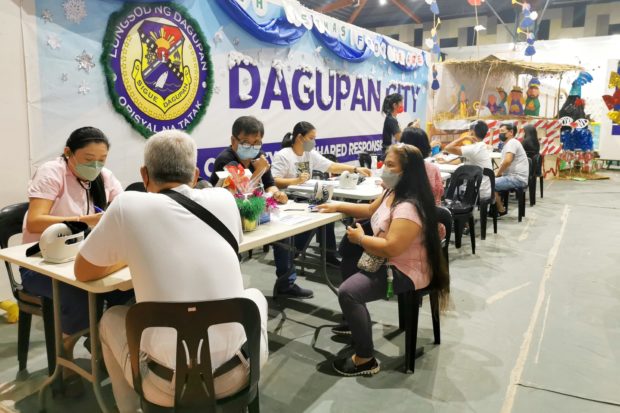Four highly urbanized Luzon cities now ‘low risk’ for COVID-19 — OCTA

File photo shows Dagupan City residents trooping to the Dagupan City Astrodome to have themselves vaccinated against COVID-19 (Photo by Willie Lomibao)
MANILA, Philippines — Independent pandemic monitor OCTA Research on Tuesday said the COVID-19 status of four highly urbanized cities in Luzon — Angeles, Dagupan, Lucena and Olongapo — has improved to low risk.
OCTA said the four cities recorded “very low” reproduction numbers at 0.23, 0.32, 0.17, and 0.25, respectively.
The reproduction number indicates how infectious a disease is. For instance, an R0 of 1 means that for each carrier transmits the virus to one person. A reproduction of less than 1 means that the infection will eventually subside.
Angeles, Dagupan, Lucena, Olongapo improved to low risk while Baguio City and Puerto Princesa improved to moderate risk. Naga and Santiago remained at moderate risk @dzbb @DZAR1026 @dzrhnews @allangatus @News5PH @NewsRmn @dwiz882 @ali_sotto @ABSCBNNews @PhilstarNews @dzme_1530khz pic.twitter.com/euAXoARVQR
— Dr. Guido David (@iamguidodavid) February 14, 2022
The positivity rate of Angeles, Dagupan, Lucena, and Olongapo is now at four percent, nine percent, four percent, and five percent, respectively, OCTA added.
Article continues after this advertisement“Cases continue to trend downward with negative growth rates and low reproduction numbers,” OCTA said in a report.
Article continues after this advertisementBaguio City and Puerto Princesa City, meanwhile, also improved to moderate risk, while Naga City and Santiago City, Isabela remained at moderate risk.
Baguio City reported a “very low” reproduction number at 0.45, while Puerto Princesa had a “low” reproduction number at 0.79.
Naga City and Santiago City posted a “very low” reproduction number of 0.28 and 0.29, respectively.
The Philippines on Monday reported a total of 3,639,942 cases, including 76,609 active cases, 3,508,239 recoveries and 55,094 deaths, according to the Department of Health.
RELATED STORIES:
Metro Manila now at low risk for COVID-19 transmission – OCTA
OCTA: Metro Manila may reach very low COVID-19 risk status by March